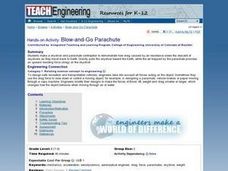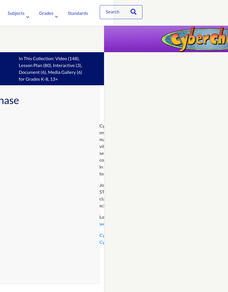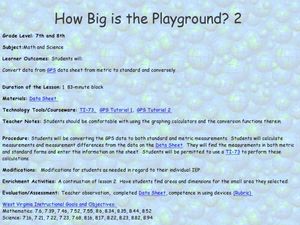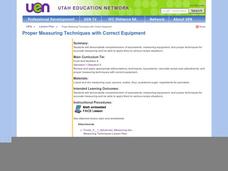Curated OER
Blow-and-Go Parachute
Students design a skydiver and parachute constraption to demonstrate how drag caused by air resistance slows the descent of skydivers as they travel back to Earth. They experience how gravity pulls the skydiver toward the earth and how...
Curated OER
Stadiums in America
Let's play ball! A great springtime activity to learn about ratios. This activity challenges learners to draw stadiums to scale on standard letter paper and also on construction paper. This three-day instructional activity includes a...
DK Publishing
Thin, Thinner, Thinnest
Reinforce comparative adjectives and relative size with a drawing activity. Kindergartners study a thin house and a thin balloon, then draw a thinner version of each. They also choose the thinnest bottle and lollipop in a group. Focus on...
DK Publishing
Practicing Multiplication Tables
Multiplication will be a breeze! Third graders work on both straightforward multiplication problems and word problems involving money and measurement. All problems involve multiplying numbers 0 - 10. A great homework assignment or...
Curated OER
Time Travel
Elementary schoolers practice measuring elapsed time between events. Learners work together to complete a worksheet, embedded in the plan, on elapsed time. The puzzle they must solve takes some time to complete. One of the tasks each...
Curated OER
What's Your Favorite Fruit?
A sweet activity to challenge your first graders! The picture graph displays a class's favorite fruits. Young learners solve various problems with the data, including counting the amounts of each kind of fruit, and interpreting which...
DK Publishing
Using a Protractor
Learn how to measure acute, right, and obtuse angles with a protractor. After reviewing the way the protractor works, fourth graders measure nine angles on their own. For extra practice, have them measure different angles in their...
Curated OER
Problems Involving Time
Put your class's time-telling skills to the test with word problems. Two examples show fourth graders how to write out the necessary equations, and how to solve for the answers. One of the problems requires two answers.
Curated OER
Thick, Thicker, Thickest
Do your kindergartners know the difference between thick and thin? After reviewing a picture of a tree and a candle, kids draw a thicker version of each in the space provided. They also draw a ring around the thickest pencil and the...
Curated OER
What's the Time? #2
Challenge your class's time-telling skills with fifteen analog clocks, all with blank faces. They write the hands in the correct places, all with times to the nearest five minutes. An easy way to extend this assignment would be a group...
Curated OER
Sorting Fish by Number
Go fish! Kindergartners match numbers between fishermen and the fish they're catching. Once kids finish their number practice, they can color the page. For extra fun, bring in plastic fish with numbers, and assign numbers to kids to...
Curated OER
Which Coin?
Manage your money with change purses and piggy banks. Once they match different coins to corresponding price tags, first and second graders add the amounts of change in each illustration. For extra practice, bring in small items for kids...
Curated OER
How Big Is The Playground?
Students calculate the standard and metric measurements of a playground. In this measurement instructional activity, students use GPS coordinates and graphing calculators to determine the dimensions of an area outside of the school in...
Curated OER
Subtraction Word Problems #1
Practice subtraction skills and word problem strategies with your second graders. After reviewing the example at the top of the page, learners solve 14 word problems involving subtraction. A great way to practice mental math!
Curated OER
What's the Time?
Can your second graders identify the time to the nearest five minutes? Seventeen analog and digital clocks prompt learners to write the correct time. The examples demonstrate how to use common references to time, such as ten minutes to...
Curated OER
Unit V: Worksheet 2 - Constant Force
Physics learners studying force and acceleration practice solving eight problems with this assignment. They calculate acceleration and deceleration, net force, and distances required for stopping a moving object. Kinematics equations and...
Curated OER
Who Has More Money?
Coloring and money combine in this fun instructional activity! First and second graders count the amounts of money represented in each, and then color the person or animal who has the most money. They then draw the correct coins to add...
Curated OER
Working with Coins #2
Practice money math with a helpful worksheet. Illustrations of coins, along with word problems, keep second graders focused on adding and subtracting different amounts of money. An excellent homework assignment to reinforce your money...
Curated OER
What Unit of Measurement?
If you're measuring a bicycle, would you use inches, feet, or yards? What about when you measure a shoe, or a flagpole? Explore measurement with this instructional activity, which prompts third graders to use their critical-thinking...
Curated OER
Proper Measuring Techniques with Correct Equipment
There is no better way to contextualize fractions than in a real-life situation. Learners demonstrate their ability to convert, measure, and determine fractional equivalents as they pertain to both liquid and dry measurements, as needed...
Curated OER
Units of Measurement
Challenge your second graders with a worksheet on units of measurement! Not only do they put their measurement skills to the test, but kids practice word problem strategies as well. The second part of the resource prompts learners to...
DK Publishing
Which is Biggest?
Help kindergartners determine which picture is biggest, tallest, longest, and thinnest! After studying four sets of pictures, kids choose the picture that is indicated in the instructions. Color the page once they're done for extra fun!
Curated OER
What's the Perimeter?
Find the perimeter of squares and rectangles with a straightforward worksheet. An example at the top of the page shows third graders how to find the perimenter, along with the addition problem necessary to find it. Pupils then work on...
DK Publishing
Using Information in Tables
Find out how well can your second or third graders use tables to solve word problems by assigning this single-page worksheet. Two tables with different sets of data prompt learners to solve six problems. An example at the top of the page...

























